Section: Movies
I’m Experimenting With Roles To Figure Out What I’m Good At: Rashmika Mandanna On How ‘Dear Comrade’ Changed Her Life And More
With Sarileru Neekevvaru and Bheeshma turning out to be huge hits, Rashmika is on a roll in Telugu cinema, and she’s only getting started. In an interview to Silverscreen India, the actress opens up about her career.
Over the past three years, since she made her acting debut in the blockbuster Kannada film Kirik Party, Rashmika Mandanna’s career has been a fairytale, so to speak. Post the success of her debut film in Telugu, Chalo, the actress went on to score a blockbuster with Geetha Govindam and followed it up with Nagarjuna, Nani starrer Devadas. Bharat Kamma’s Dear Comrade changed people’s perception about her acting chops, and the success of her recent films like Sarileru Neekeevvaru and Bheeshma proved that she has found her space in mainstream commercial cinema as well.
Excerpts from an exclusive interview:
From Chalo to Dear Comrade, you’ve mostly played characters that are subtle and serious to an extent. And then, Sarileru Neekevvaru and Bheeshma were more commercial. What drove you to make these choices?
I don’t know what I’m capable of and what suits me best. I’ve never been to an acting school. Even though I’ve done a few films, acting itself is extremely new to me. I didn’t know a word of Telugu when I signed Chalo, but director Venky Kudumula was extremely supportive. The Telugu film industry seemed too big for me and I kept wondering if I’ll find a place there. I owe a lot to Venky, because he trusted me. Even while shooting Chalo, I knew that I wanted to work with Venky again, and when Bheeshma happened, I was more than happy to collaborate with him again. He says that I’ve improved a lot compared to Chalo, and I take his feedback quite seriously. I tried doing comedy for the first time in Sarileru Neekevvaru, but if you ask me if I relate more to roles I’ve done in Dear Comrade or Sarileru Neekevvaru, I wouldn’t have an answer. I’m experimenting with my roles to figure out what I’m good at, and it’s a question that I keep asking myself all the time, because every film feels like a stepping stone for the next one. And when you take up something, you might as well try to be the best at it.
In an earlier interview, you said that you had to depend a lot on Anil Ravipudi to guide you throughout the shoot of Sarileru Neekevvaru. Was there ever a moment where you got a complete hang of the character you are playing given how dramatic she is?
I don’t know what it’s like to do comedy on screen, especially when it’s so dramatic. Moreover, I’m working with some really big names like Mahesh Babu, Vijayashanti, Prakash Raj, and Sangeetha. Your comic timing has to be perfect and in sync with what the director has envisioned. It’s Anil’s script and he knows better what he wants. The only time where I didn’t have to be dependent on his guidance to play the part was when we shot the climax. It was hard because last year, I was doing four films at the same time. Sometimes, I wish I could do just one film at a stretch and feel the pulse of the character easily. It happened with Dear Comrade, but this time, I didn’t know how to pull it off without relying on the director at every step.
Given how dramatic your role was in Sarileru Neekevvaru, there was also quite a bit of criticism. Did that affect you?
It’s extremely hard to perform comedy. The character is meant to be so goofy and dramatic, and my job is to perform to the best of my abilities to match the director’s vision. It was such a big contrast from what I played in Dear Comrade, and I’m glad that this has happened because, in the process, I’ve amazed myself that I’m capable of doing it. I know after my recent set of films, people might have had different expectations from me. People said what they wanted to and I understand that they want to see me in more serious roles, but doing a comic or an overdramatic role counts as performance too. I’m glad I did Sarileru Neekevvaru because I got to work with Mahesh Babu, Anil Ravipudi, and it’s an experience I’ll always cherish.
Did your life change after playing Lily in Dear Comrade? Quite frankly, that’s still your best performance till date…
I had invested so much of myself into being Lily. It changed me as a person in the sense that before playing Lily, a part of me suffered from low self-esteem. I used to wonder if I’m good enough and if I deserve all this name or fame. After playing Lily, I’m more confident as a person. I convinced myself that I’m here for a reason and people have supported me. It’s not just the character alone, but I think the people around me have changed me too. Earlier, I used to just keep quiet no matter what people said thinking that this is how things are, but later, I started speaking out. As much as it affected people, it has affected me too. I’ve had a lot of people tell me that they were so inspired by the character that they started speaking out after watching the film, and I’m doing it too in some ways. I don’t keep quiet when someone says something wrong about me, especially on social media, and there have been occasional outbursts (smiles). “It’s not fair, treat me as a human being as well. Why are you being so rude?” I’m just happy that I’m getting there. Lily has helped me change in a positive way.
You have now done films in Telugu, Kannada, and you’ll soon make your debut in Tamil too. Has this journey as an actor changed you as a person?
I would like to believe that I’m an open book. Luckily, I feel very grounded and that’s how I have been raised. We have had our ups and downs in life, and now that I’m acting in films and thankfully doing well here, nothing has changed for us as a family. Not much has changed amongst us, but there are times, when I walk alone on a street, people do recognise me, especially when they see my tattoo (Irreplaceable) on my forehand. That feels nice, but I know that there’s a long way to go. I still don’t know what success is and ‘having arrived in life’ means. There’s no end to this pursuit. I don’t see the result. I’m just focusing on my work.

Rashmika Mandanna Photoshoot Stills
What’s the story behind the tattoo?
I was 15 and still in college, when someone challenged me that girls can’t take too much pain because getting a tattoo done hurts. And I wanted to prove him wrong. When someone dares me or says that I can’t do something, it ticks me off. My roommate suggested that I should choose this word “Irreplaceable”. I don’t know if she was scolding me or praising me, but I stuck to it. I wouldn’t do that when it comes to my work (laughs). I’ve become more practical in a way.
What goes through your mind while choosing your films? With Sukumar-Allu Arjun’s next, and Sultan with Karthi, and Pogaru with Dhruva Sarja, 2020 looks like quite a busy year ahead for you…
I want to do characters which I haven’t done before and I’m allowed to make mistakes at this point of my career. It’s all about the script. I want the directors to get the talent out of me, and push me to do more challenging roles, both physically and emotionally. I have a bunch of films lined up this year, and I know that this year, I’m going to live for myself and remember each day and make memories. No matter how hectic work is, as a person, I’m quite positive and keep wishing the best for everyone. I’m like water. You put me in anything, I’ll adapt to it. If you have me in your life, it’s good for you, I guess (laughs). 20 years later, when I look at myself, I want to be proud of what I’ve done.
Hemanth Kumar C R is a Hyderabad-based film journalist and he has been writing about Telugu cinema for over a decade. An avid reader, Chai-addict, and a philomath, he spends most of his time hoping that every Friday turns out to be a pleasant one at the movies.
Shah Rukh Khan Offers His Personal Office For Quarantining; BMC Expresses Gratitude
Actor-producer Shah Rukh Khan has offered his personal office space to the Brihanmumbai Municipal Corporation (BMC) for quarantining children, women, and elders in the wake of the Coronavirus pandemic. The four-storey building has also been equipped with the required facilities and services for the quarantined individuals.
The BMC has expressed its gratitude to Shah Rukh and his wife Gauri for their generosity.
We thank @iamsrk & @gaurikhan for offering their 4-storey personal office space to help expand our Quarantine capacity equipped with essentials for quarantined children, women & elderly.
Indeed a thoughtful & timely gesture!#AnythingForMumbai#NaToCorona https://t.co/4p9el14CvF
— माझी Mumbai, आपली BMC (@mybmc) April 4, 2020
A few days ago, a statement from his production house Red Chillies Entertainment was released. The statement said that Shah Rukh Khan’s group of companies, Red Chillies Entertainment, Kolkata Knight Riders, Red Chillies VFX, and Meer Foundation had decided to announce several initiatives to support the government and fight against the global threat.
Further, it said that the actor along with his team was looking out for modest ways to help solve the problem. Khan had also appreciated the efforts of Prime Minister Narendra Modi, Chief Ministers Uddhav Thackeray (Maharashtra), Arvind Kejriwal (Delhi), Mamata Banerjee (West Bengal) and leaders of other states and union territories. SRK said that he, along with his team, would be focussing on three cities — Mumbai, Kolkata, and New Delhi to start off and will extend help in any possible way.
He emphasised on how humanity was the need of the hour and that supporting each other could help the entire nation cross this difficult phase. The actor said that it was the duty of the nation to give its best and that he would be doing so too. He also added that the compassion shown towards the section of society that would bear the brunt of both the pandemic and its economic repercussions defines the people and India as a nation.
“The scourge we are up against is fearsome and unknown to us. Like all uncharted paths, our journey to overcome every new challenge it throws at us will be arduous. There will be times when the best intentions might yield the wrong results. There may also be times when we accidentally stumble upon important solutions. All we can really do is try our utmost to adapt and confront each challenge with courage,” said the actor.
Whilst we stay safe at home,many r working for our safety & fending for themselves. Here’s our little contribution to ensure their health & well being! Separate but together,we will overcome! @iamsrk @PMOIndia @narendramodi @OfficeofUT @AUThackeray @MamataOfficial @ArvindKejriwal pic.twitter.com/7MI2KT7770
— Red Chillies Entertainment (@RedChilliesEnt) April 2, 2020
The statement also said that the aim of the initiative was not only to provide relief to the people but to also create awareness of the virus and encourage more people to help. The initiatives included:
- Contribution to the ‘PM – Cares Fund’ by the actor’s Indian Premier League (IPL) franchise Kolkata Knight Riders (KKR).
- Contribution to the ‘Maharashtra Chief Minister’s Relief Fund’ by the actor and wife’s Red Chillies Entertainment.
- KKR and Meer Foundation will associate with the governments of West Bengal and Maharashtra and contribute 50,000 Personal Protective Equipment (PPE) kits to the frontliners – doctors and healthcare workers. They will also work to raise awareness to encourage other contributions.
- Meer Foundation along with Ek Saath: The Earth foundation, will provide daily food requirements to over 5,500 families for at least a month in Mumbai. A kitchen will also be set up to provide 2,000 freshly cooked meals every day to help households and hospitals whose daily needs aren’t being met.
- Meer Foundation will also associate with Roti Foundation, founded by former Maharashtra DGP D Sivanandhan, to provide 3 lakh meal kits to 10,000 people per day for at least a month. Roti Foundation has also already tied up with Mumbai Police and is providing meals to underprivileged people and daily wage workers.
- Meer Foundation in association with Working People’s Charter will provide basic essentials and grocery items for at least a month to over 2,500 daily wage workers who have been identified across Delhi.
- Meer Foundation will provide a monthly stipend to over 100 acid attack survivors across Uttar Pradesh, Delhi, Bihar, West Bengal, and Uttarakhand for their basic needs.
In response to the statement, Uddhav Thackeray, Arvind Kejriwal, Mamata Banerjee, and the various foundations put out tweets thanking the actor for his support.
Thank you @iamsrk, your contribution will help assist a lot of distressed people during these challenging times. Such humane benefaction will keep inspiring millions in this country who look up to you as their role model with respect and reverence. https://t.co/pj5bg77XUl
— Mamata Banerjee (@MamataOfficial) April 4, 2020
Thank you Shah Rukh ji for you kind words. Your generous contribution will touch many lives in this difficult hour. @iamsrk https://t.co/boaozsUXw8
— Arvind Kejriwal (@ArvindKejriwal) April 3, 2020
Thank you @iamsrk ji @gaurikhan ji🙏🏼 https://t.co/aX80TDoWQV
— CMO Maharashtra (@CMOMaharashtra) April 2, 2020
Thank you @iamsrk @RedChilliesEnt @MeerFoundation for your support in feeding people during COVID-19. https://t.co/mQZb4HZGhA
— Mumbai Roti Bank (@rotibankFdn) April 2, 2020
We at Ek Saath are extremely grateful to @imsrk & @Meerfoundation for their immense generosity and support.
We will fulfill an urgent need to provide 5500 families of daily wage workers with enough ration to sustain for a month in these difficult times. pic.twitter.com/Geyhivowkt
— Ek Saath Foundation (@ek7foundation) April 3, 2020
Apart from this, Shah Rukh has also been creating awareness about the virus and ways to tackle the situation on his social media handles. He had recently posted a light-hearted video comprising visuals from his films to explain the dos and dont’s at this time.
InshaAllah #JantaCurfew will help against the spread of virus, though we may have to do this again. The clapping brought so much cheer. So a reminder of safeguards, with some cheer… Pls take it in the right spirit. To all relentlessly working today – Extremely Grateful. Thx! pic.twitter.com/2wfaXPlFVF
— Shah Rukh Khan (@iamsrk) March 22, 2020
Several other stars like Akshay Kumar, Ajay Devgn, Varun Dhawan, Shilpa Shetty, Alia Bhatt, Kartik Aaryan, Nana Patekar, Madhuri Dixit, Karan Johar, Ayushmann Khurrana and others have also contributed to Covid related funds.
Watch the awareness video by Shah Rukh Khan here:
Telugu Film Journalists Association Comes Together To Help Its Less Privileged Members
Telugu Film Journalists Association (earlier known as Film Newscasters Association of Electronic Media) supports 35 cine journalists during the Corona crisis. With the announcement of a nation-wide lockdown following the outbreak of coronavirus in the country, everything has come to a standstill.
The Telugu film industry has set up the Corona Crisis Charity (a fund) for the welfare of cine workers. Meanwhile, the welfare of cine journalists, who work without holidays in order to publish film-related news, has been taken care of by the Telugu Film Journalists Association.
Speaking of this initiative, the TFJA President, Lakshmi Narayana said, “We have and will always care for the needs of on-field journalists who attend press meets, no matter which media they represent. We have reached out to 35 journalists and have handed over all essentials needed for one month to help them tide through the crisis.”
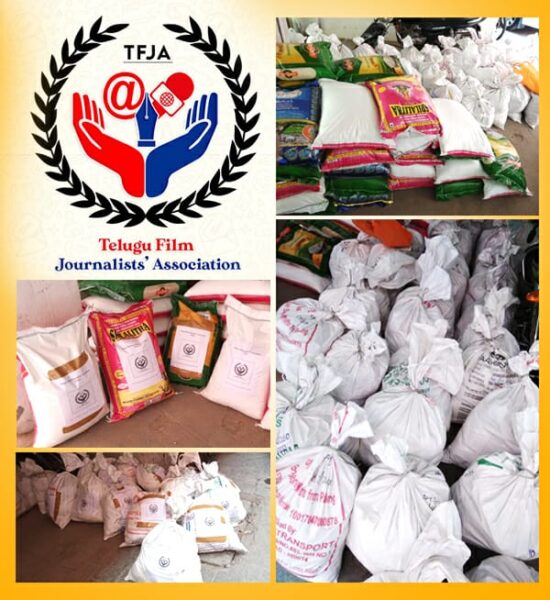
COVID19 Donation
The journalists are from print and electronic media, as well as photo journalists. Elaborating on this the president said, “Our aim is that nobody should go hungry. If there is anyone who is facing any issues, they are free to reach out to us, or Naidu Surendra Kumar or Rambabu of TV5 on phone. We are in a crisis, and we want members of our fraternity to know that we will always be there to help them out. We sincerely hope that we can get back to normalcy soon. I would like to especially mention that there are a lot of people who have backed us, my sincerest gratitude to them.”
Nayanthara Contributes To FEFSI’s Fund For Daily Wage Workers
Actress Nayanthara, considered the Lady Superstar of the industry, is the latest from the film fraternity to contribute to the Film Employees’ Federation of South India (FEFSI). The actress has chipped in 20 lakh rupees for the benefit of daily wage workers who are currently in a state of crisis owing to the Coronavirus pandemic.
#FEFSI president #RKSelvamani Thanked #Nayanthara for donating 20 Lakhs to the union which will be more helpful in the current situation.#COVID2019 pic.twitter.com/6RC0GCD1jm
— Jaya TV (@JayaTvOfficial) April 4, 2020
On March 23 afternoon, the Film Employees’ Federation of South India (FEFSI) put out a statement concerning the livelihood of daily wage workers and employees of the South Indian film industries. It spoke of the troubles they are facing owing to the Coronavirus outbreak which has halted film shooting, and other work. The federation made a request to the film fraternity to donate money for the procurement of rice bags, a basic need, for employees. The statement had also mentioned that 15,000 members of the 25,000 member organisation comprise daily wage workers who live off the income earned from shooting sets every day.
Last week, actors Jayam Ravi, Udhayanidhi Stalin, and Aishwarya Rajesh and composer Anirudh Ravichander had contributed to FEFSI. They had contributed five lakhs, ten lakhs, one lakh, and two lakhs respectively.
Apart from the stars, director Karthik Subbaraj (1 lakh), cinematographer R Rathinavel (55k), actor-producers Kushboo and Sundar C (5 lakhs), actor Ponvannan (25k) and several other artists, PRs and journalists had made their contributions in cash. Producer Kotapadi J Rajesh, Super Good Films and actor Jiiva, actor Yogi Babu, artists Shankar Krishnamoorthy, Jeeva Ravi, and several others had also contributed in kind.
Previously, actors Suriya, Karthi and their father Sivakumar had donated a sum of 10 lakhs to the organisation. Further, actors Rajinikanth (50 lakhs), Kamal Haasan (10 lakhs), Dhanush (15 lakhs), Sivakarthikeyan (10 lakhs), Vijay Sethupathi (10 lakhs), producer Lalit Kumar’s Seven Screen Studio (10 lakhs), director Shankar (10 lakhs), Harish Kalyan (1 lakh), production house Sathya Jyothi Films (1 lakh), director P Vasu (1 lakh), Supreme Sundar (1 lakh) director Lokesh Kanagaraj (50k), Aadukalam Naren (25k), Chithra Lakshmanan (25k), Actress Sachu Kumari (10k), and several other actors, producers, and still photographers had also made their monetary contributions.
The Tamil Film Press Association, the Salem head of ‘Vijay Makkal Iyakkam’, production houses Axess Film Factory, 11:11 Production, producer Dhanu, actors Radha Ravi, Manobala, directors Hari, Santhana Bharathi, and Sanjay Bharathi and several others had also made their contributions in kind by donating a certain amount of rice and dal bags.
#FEFSI Contributions By Celebrities, Directors & Producers 👇 pic.twitter.com/h3kDJWWaTq
— VIJAY ANNA Fan (@MathaiyanVijay) March 24, 2020
A few days back, a statement by RK Selvamani, President of FEFSI, revealed that the total amount collected stood at 1.59 crores with 1,983 kilos of rice. While he thanked all the stars for their contributions, he also expressed his displeasure at how the Tamil film industry wasn’t being as altruistic as the Telugu or Hindi film industry which has been making contributions in crores for daily wage workers.
While Salman Khan has contributed 50 crores to the Bollywood film industry workers, Megastar Chiranjeevi, who recently joined Twitter, has contributed 1 crore for the Telugu film industry daily wage workers.
.@BeingSalmanKhan showed his unconditional love and charity for the people. Extended financial help to 25,000 daily wage workers of Bollywood, amount will be credited to their bank accounts
#BeingConsistentIsBeingHuman #LetsFightCorona pic.twitter.com/dzFCHkWDsW— BARaju (@baraju_SuperHit) March 30, 2020
FEFSI added that the amount contributed is not enough to help out the 18,000 workers of the industry and have thereby requested the film fraternity once again to donate generously.
“We are planning to give Rs 500 and 25 kilos of rice to 18,000 daily wage workers but the amount collected so far is not sufficient,” said RK Selvamani.
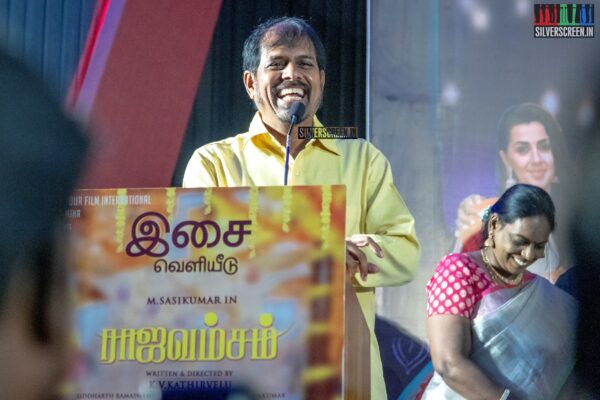
Meanwhile, following the statement put out by the South Indian Artists Association / Nadigar Sangam, the Federation of Small Screen Technicians, Tamilnadu has also put out a statement seeking financial assistance. It mentioned that it seeks to help out technicians, writers, and directors of the television industry.
After #FEFSI and #NadigarSangam , now TV union is asking for financial help.!@RIAZtheboss pic.twitter.com/I85QDwa6TQ
— V4UMEDIA (@V4umedia_) March 26, 2020
Happy Birthday: Simran
A Down To Earth Rajinikanth Goes ‘Into The Wild’ With Bear Grylls; Streaming On Discovery Plus
“When you’re a Superstar it’s easy to say ‘No’ and stay inside your comfort zone. But you never grow inside your comfort zone and the reason he’s at the top is that he’s always stepping out of that comfort zone. He’s tired but he never gives up and he’s relentlessly positive. I love that in him,” Bear Grylls says at the end of one of the most anticipated episodes of his show, Into The Wild. I think it’s something the film fraternity and audience will agree with as well. There’s something about the Superstar that makes him everyone’s favourite.
This Into The Wild episode saw actor Rajinikanth and Bear Grylls venturing into the Bandipur Tiger Reserve in Karnataka where they walk through a path that has venomous snakes, cross a rusty dilapidated bridge, sample the water flowing in a ravine and un-strap a camera fixed in a water hole at the end of the park. Through the 45 minutes, all you see along with a perfect host is a happy man willing to take risks forgetting his age and his fame.
After 43 years in the film industry, having starred in 165 films, there is much that the 70-year-old actor could have demanded. Instead, you see a humble man who is open to everything he encounters. I can’t help but adore his childlike enthusiasm when he completes each task. He thanks God, he motivates himself constantly and feels proud of himself at the end for being able to accomplish a feat he’d never thought he would indulge in. “Yes, I did it!”, “I’m doing real adventures, things I haven’t done before in my life”, “It’s going to be tough, but yes God is there.” These are just a few of the many things he says right through the episode.
Bear also says that “One of the reasons I think he’s (Rajinikanth) so loved is that he wears his heart on his sleeve.” No matter what emotion he is going through — worry, anxiety, happiness, excitement, it is out in the open for us to see. We can see the person behind the icon, the most real embodiment of ‘what you see is what you get’.
When Bear asks him about how he handles stardom, he explains how he clearly distinguishes his work life from personal life. He says he tends to forget that he’s Rajinikanth once a film is wrapped up and gets into the shoes of Shivaji Rao Gaekwad. And his curiosity in finding out how Bear is unfazed about chowing down insects and creatures, what he enjoys about his acting and how he managed to end up in Discovery, stands testament to his words. There is certainly no need for someone of his stature to worry about what opinion someone who’s not from his homeland has formed of him. Yet the “Your face is full of expression and you do everything with a wink,” leaves him gleaming in joy.
While the episode essentially aims at showing us who Rajinikanth actually is as a person, it doesn’t compromise on showcasing his swagger either. He has a filmy introduction with his costume changing as he twirls around, his vehicle disappears at the snap of a finger and there are even a few shots of the actor shaking a leg. The iconic title card along with a montage of shots from various films in the episode is a smart marketing move, catering to fans and audiences especially in India, more so in South India.
Even as Grylls is speaking in English, Rajini speaks in Tamil, this is endearing. Grylls’ handling of the show and his guest Rajinikanth is a sight to behold. He is respectful but does not fawn. He isn’t giving out orders nor is he requesting the actor to perform duties, like fitting a tyre, reversing the jeep or even collecting water sample. He hits the right note. There is no ‘Rajini sir’. He is ‘Rajini’. And the actor looks more than comfortable with this.
The disclaimer card at the start of the show says that the channel does not propagate any opinion related to religion or political parties. Rajinikanth, who recently announced that he wouldn’t contest for the position of the Chief Minister but will lead a party, has not really been clear about his political stance on various issues. However, at various points in the show, his political ideologies and concerns are showcased not so casually.
Read: Rajinikanth And The Art Of The Political Flip-Flop; Actor Bats For NPR
While we see video messages from friends Madhavan and Akshay Kumar motivate the actor on his journey, actor-director-friend and fellow politician Kamal Haasan speaks of water scarcity, thereby sparking a discussion about the same. Bear himself asks, “And what is the message? What must people do?” to the actor. It seems, like Kamal’s ‘message’ for the journey was rather a mechanism to get Rajinikanth to promote his vision for India. After all, why would a star agree to something like this unless it’s coupled with a motive?
The episode is streaming on Discovery Plus for premium members.
Why The South’s Embrace Of Screenwriters Can Only Mean Good News For Cinema
In the past fortnight, two announcements have been met with a fair bit of surprise in the Tamil film industry. Simply because both are pushing the envelope a bit more when it comes to the tried-and-tested ‘kadhai-thiraikadhai-vasanam-iyakkam’ (story-screenplay-dialogue-direction) format.
Dance master Brinda makes her debut as a director with Hey Sinamika, starring Dulquer Salmaan, Aditi Rao Hydari, and Kajal Aggarwal. She’s working with lyricist Madhan Karky for the story, screenplay, and dialogues. And, Karthick Naren has teamed up with Sharfu and Suhas of Virus fame for his film with Dhanush.

In the early decades of Tamil cinema, there were writing teams. Later, Sujatha famously worked with Shankar and Mani Ratnam, including in Endhiran, Kannathil Muthamittal, Roja and Anniyan, while Balakumaran was popular for his work in Nayakan, Guna, Baasha, and Pudhupettai, among others. KV Anand has always been known to work with writers Suba.
More recently, Gautham Vasudev Menon directed the web series Queen, written by Reshma Ghatala, his associate. Years ago, he co-wrote Jiiva and Samantha-starrer Neethaane En Ponvasantham with Reshma. Lokesh Kanagaraj, who is riding high on the success of Kaithi, has collaborated with Aadai-fame Rathna Kumar (he’s doing the additional screenplay) for Vijay-starrer Master. Last year’s hit, Ashwin Saravana’s Game Over would not have been what it was without co-writer Kaavya Ramkumar’s contribution. As for Hindi, published author and writer Kanika Dhillon is a brand by herself and works with the best of directors. So far, these have been seen as exceptions rather than the norm. That might be slowly changing.
Karthick Naren, whose last film Mafia, starring Arun Vijay, Prasanna, and Priya Bhavani Shankar, was praised for its style and criticised for its writing, on teaming up with writers for his next: “I like this idea of a collaboration. I am working with a huge star, and I wanted someone with that sensibility to work with me. Somehow, I feel writing is about imagination, and that aspect of a film must be without boundaries. When a director writes, that freedom is fettered. This is a common system in Hollywood; the writer and the director are different.”
In fact, the director says he is listening to others’ scripts that he can possibly direct later. “When you work with someone you sync well with, the process of creation becomes interesting. I like both writing and direction, but I always feel I had a lot more time to write Dhuruvangal 16, since I wrote it before shooting, and that was my only job. Now, I believe a professional writer is important to help fill in gaps, and to let the director visualise.”
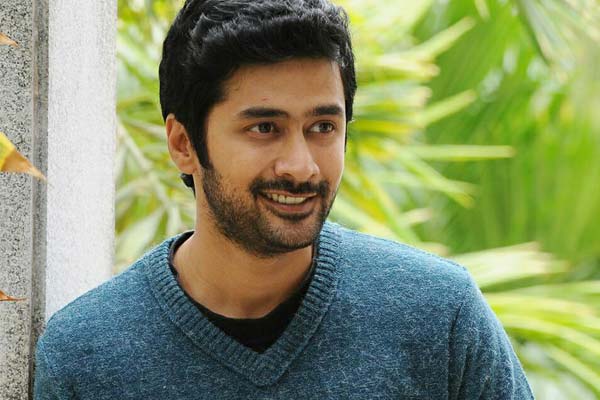
Rahul-Ravindran
Rahul Ravindran who won the National Award For Best Original Screenplay for his debut directorial Chi La Sow, and adapted a French film for his second, Manmadhudu 2, says that while he loves writing, he’s always open to working with someone else’s content, especially, if it’s something he’s not capable of writing himself. “Writing and direction are two completely different skill-sets, and they need not go together. Many think a director is worth his salt only if he writes. I differ. Directing is a technical job that requires high skill. It’s perfectly fine for a director to be excited by someone else’s material and choose to just direct a film.”
Rahul points out that since directors get paid way more than writers, most writers attempt to switch to directing at some point. “What will work is a system where a talented pool of well-paid writers constantly churn out quality stuff that someone else can direct. We must get one thing clear. There are different kinds of projects — some driven by actors, some by writers, and some by directors. There should be space for all,” says Rahul. Interestingly, before he began work on his next film, Rahul tweeted out the broad outline of a scene and asked those interested in writing to come up with something. Adhitya, a young graduate who replied, now interns with Rahul.
Rahul says there are many ways of approaching a film — waiting for years to crack a great idea and flesh it into a two-hour script; working with a script you’re not entirely happy with just because you need to keep making films; using someone else’s readymade content and directing it. “If someone writes better than you, use them,” he says.
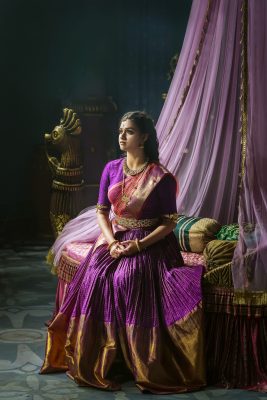
Madhan Karky has worked on dialogues for films including Shankar’s Enthiran and Nanban and Mahanati’s Tamil version Nadigaiyar Thilagam. He collaborated with SS Rajamouli to create the Kiliki language for one of the warring tribes in Baahubali, and is also working on the dialogues for the Tamil version of RRR, starring Ram Charan and Junior NTR. He moves on to write an entire film with Hey Sinamika. “Earlier, this was the system. Every production house would have a kadhaikuzhu (a story group), which kept writing. However, with time and the lack of recognition for writers, many turned to direction. What I find is that directors who think big, like Rajamouli and Shankar, prefer being left alone to visualise. Sometimes, writing disturbs the director’s thought process,” he says.
Rajamouli, for instance, works with his father, writer KV Vijayendra Prasad, who has written blockbusters such as the Baahubali franchise, Bajrangi Bhaijaan, Mersal, Eega, and Magadheera. Karky says the Malayalam industry has popularised this model again in recent years, and if Tamil accepts it too, it will be “a healthy change and recognition for writers”. Speaking about Hey Sinamika, he says he has been “enjoying the process. I have been given the freedom to do the story, screenplay, and dialogues, and it’s been a rewarding experience. In fact, inspired by this, I’ve started working on ten more stories that I hope to pitch to producers. Shifting from one aspect of writing to another gives me the freedom to do a lot of things, and I like it all the more because I’ve always been fond of telling stories.”
In Kannada, Rakshit Shetty is one of those stars who has involved himself in almost every aspect of the film industry. He writes, acts, directs, produces and distributes movies. In fact, Avane Srimannarayana in which he starred was written by Rakshit Shetty and The Seven Odds – Chandrajith, Abhijit Mahesh, Sachin Ravi, Anirudh Kodgi, Nagarjun, and Abhilash.
“If a director is a writer, nothing like it. But, even if he is not, it’s nice if he can get involved in the process at some level. In fact, when we wrote Avane…, director Sachin Ravi was with us throughout, and thoroughly involved. He had a complete grip on what the film was about. When we write in a group, there has to be one person who guides the team, who knows exactly what is being written. That said, there are people who can take a bound script, read it, and direct. I prefer a more collaborative process because I feel the perception of the writer and director has to sync. Even with Charlie (written and directed by Kiranraj K, and starring Rakshit), I did give my inputs. That said, I definitely think good writing is the basis of any cinema. Without good writing, you cannot make a good film,” adds Rakshit who takes a call on collaborating or not with a writer, depending on the project. “Some films, say Punyakoti that I will be doing, I’d like to write on my own. I think it depends on the philosophy behind a film and the journey it will take.”
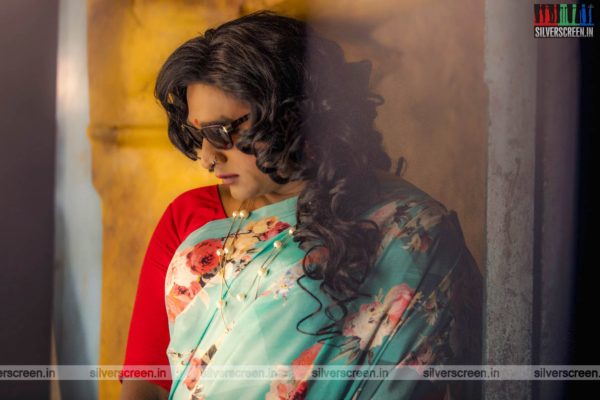
Exactly a year ago, a film that demanded this kind of writing released. Super Deluxe brought together Thiagarajan Kumararaja, Mysskin, Neelan, and Nalan Kumarasamy. The various worlds that collided in this universe needed different voices to write them. Even today, one can only guess who wrote some of the episodes; Kumararaja chose to keep that under wraps. Similarly when Shankar’s Indian 2 releases, the world will see what writers Jeyamohan, Kabilan Vairamuthu, and Lakshmi Saravanakumar have lent to the script and dialogues.
Why do people collaborate on something so deeply personal as a story/script? Gautham Menon, who has always been open to collaborations, says: “Working with someone helps provide a different dimension to your work. If I find something in my zone, it works out well. I’m now working with some American writers. The process is nice. I set it up, and they write page after page for me. I hope to direct this at some point. Queen 2 is also happening, and I’m reading some other material writers have sent in. What I look forward to working with is something that could have come from me or something that did not come from my mind space but which stuns me. I like a bit of this and that.”
Does he prefer being a writer or director? “Writing is not very easy. I enjoy it, but it is rough and not an easy process. You need to be constantly inspired to create. Direction comes more easily to me. I can move to Plan B or C depending on what is happening.”
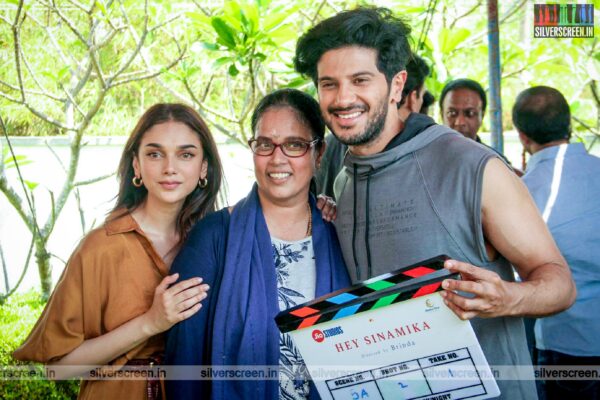
Another person who has transitioned to direction is a choreographer known for the ‘story’ in her dance sequences. Brinda Master is working with hugely popular actors and an equally popular lyricist-writer, and says this model of splitting the direction and writing team will work.
“Mumbai and Kerala are already doing this. In the case of Hey Sinamika, I somehow felt that it would be better if I worked with someone who knows Tamizh well, and it has worked out beautifully. Directing is like dance choreography too, and so it’s not much of a difference, it’s almost a natural extension,” she says. (In a Twitter banter with actor-director Prithviraj, Dulquer said Brinda tends to say ‘music’ instead of ‘action’ but is otherwise having a whale of time directing). Brinda says a good story can come from any space. “Even a child can write something that deeply appeals to the director in me.”
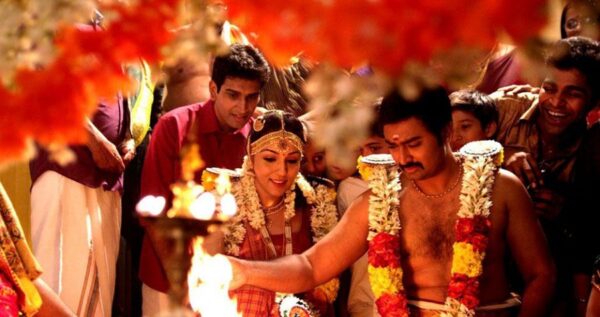
Kalyana Samayal Saadham, was director RS Prasanna’s own script. After that he made a biopic on Swami Chinmayananda, titled On a Quest, working with a script from the Chinmaya Mission. When he went to Bollywood to make Shubh Mangal Saavdhan, he worked with writer Hitesh Kewaliya, who transplanted the film from South India to the heart of the North. “I always saw myself as a pure director, even from school, when I would work with content from Crazy Mohan and S Ve Shekhar and create something for the school play. I think I always delineated between director and writer, instinctively. Writing for me is deeply personal, like KSS was. I want to do that kind of writing once in three or four years; it takes that much from me. As a writer myself, I love working with other writers purely as a director. I love writing, but find it easier to direct. It comes naturally and appeals to me more than writing does.”
Hemanth Rao has done both: write and direct films (the much-feted Kannada films Godhi Banna Saadharana Mykattu and Kavaludaari) and write for someone else – he was part of the National Award-winning team of writers who won the Best Screenplay (adapted) for Sriram Raghavan’s Hindi superhit Andhadhun.

He’s now working on his next with Rakshit, Sapta Sagaradaache Yello (Beyond the seven seas). He has a nuanced take on working with a writer. “When you write and direct, there are some gaps you leave, relying on the director in you to fill them up. It becomes a much easier process too because the two roles are performed by the same person. That said, for another director to hit the same notes the writer intended becomes a challenge. Sticking to just writing is also an interesting exercise because you just focus on the storytelling, the detailing and nothing else. You’ve written the best version of the story you want to say. You are free, and that’s a nice feeling. You don’t allow thoughts such as budget and performance to rein you in. A director just has to translate that on screen. I am someone who entered the field as a writer, and learnt direction as a skill through observation and reading. Writing comes naturally to me. But, I also look out for stories from others that will test me as a director, and help me hone my craft. Now, while writing Sapta… I have teamed up with my long-term associate Gundu Shetty, who co-directed Kavaludaari and was part of the writing team too. I like his perspective.”
Does Hemanth ever feel he’s ceding control when he works with another writer? “No. The core idea is mine, the frame is mine. It’s nice to let someone else colour it, ensuring it never smudges the borders.”
After his script for Adho Andha Paravai Pola was approved by the producer, Arun Rajagopalan was asked if he wanted to direct. The young writer chose not to because that was not his forte. “Our industry tries to follow trends, and that’s where writers lose out. Everyone makes a similar film if the first one does well. That said, no one seems to worry about the fact that for the audience, what really matters is a good film that entertains or engages them in some way. In Tamil, I will say that if four or five writer-driven films do well, that might well become a trend. Else, it shall remain a struggle. In case some people opt for this for the sheer novelty factor, it won’t work.”
While the Kerala model of superstar writers such as Syam Pushkaran, Murali Gopy, Dileesh Nair and Unni R who get top billing may take some time to arrive in other industries, at least some have begun to give importance to the role of a writer. And when this happens, cinema stands to benefit. As does the audience.
Jayam Ravi, Udhayanidhi Stalin, Anirudh Ravichander, And Aishwarya Rajesh Contribute Towards FEFSI’s Fund For Daily Wage Workers
Actors Jayam Ravi, Udhayanidhi Stalin, and Aishwarya Rajesh and composer Anirudh Ravichander are the latest among the film fraternity to contribute to the Film Employees’ Federation of South India (FEFSI) for the benefit of the daily wage workers. They have contributed five lakhs, ten lakhs, one lakh, and two lakhs respectively.
.The ever humble and helpful @actor_jayamravi has donated ₹5 lakh to the #FEFSI trust for the welfare of its members 👍👏#Corona #COVID19 pic.twitter.com/kpO2pNVkuP
— TamilNadu Cinema Information (@Tamilcineenama) April 1, 2020
Music director @anirudhofficial donated ₹ 2 lakhs
to #FEFSI Workers due to#CoronaVirusLockdown#Aniruth#COVID19 pic.twitter.com/MsZITvCPfC— Priya – PRO (@PRO_Priya) March 28, 2020
On March 23 afternoon, the Film Employees’ Federation of South India (FEFSI) put out a statement concerning the livelihood of daily wage workers and employees of the South Indian film industries. It spoke of the troubles they are facing owing to the Coronavirus outbreak which has halted film shooting, and other work. The federation made a request to the film fraternity to donate money for the procurement of rice bags, a basic need, for employees. The statement had also mentioned that 15,000 members of the 25,000 member organisation comprise daily wage workers who live off the income earned from shooting sets every day.
Apart from the stars, director Karthik Subbaraj (1 lakh), cinematographer R Rathinavel (55k), actor-producers Kushboo and Sundar C (5 lakhs), actor Ponvannan (25k) and several other artists, PRs and journalists have made their contributions in cash. Producer Kotapadi J Rajesh, Super Good Films and actor Jiiva, actor Yogi Babu, artists Shankar Krishnamoorthy, Jeeva Ravi, and several others have also contributed in kind.
Me and my better half #SundarC have donated ₹5 lakhs to #FEFSI to help members of our fraternity who have been out of work due to lockdown and have families to take care of.. I request my other colleagues and friends to show large heartedness and come forward to help more.
— KhushbuSundar ❤️ (@khushsundar) March 28, 2020
Previously, actors Suriya, Karthi and their father Sivakumar had donated a sum of 10 lakhs to the organisation. Further, actors Rajinikanth (50 lakhs), Kamal Haasan (10 lakhs), Dhanush (15 lakhs), Sivakarthikeyan (10 lakhs), Vijay Sethupathi (10 lakhs), producer Lalit Kumar’s Seven Screen Studio (10 lakhs), director Shankar (10 lakhs), Harish Kalyan (1 lakh), production house Sathya Jyothi Films (1 lakh), director P Vasu (1 lakh), Supreme Sundar (1 lakh) director Lokesh Kanagaraj (50k), Aadukalam Naren (25k), Chithra Lakshmanan (25k), Actress Sachu Kumari (10k), and several other actors, producers, and still photographers had also made their monetary contributions.
The Tamil Film Press Association, the Salem head of ‘Vijay Makkal Iyakkam’, production houses Axess Film Factory, 11:11 Production, producer Dhanu, actors Radha Ravi, Manobala, directors Hari, Santhana Bharathi, and Sanjay Bharathi and several others had also made their contributions in kind by donating a certain amount of rice and dal bags.
According to a statement by RK Selvamani, President of FEFSI, the total amount collected stands at 1.59 crores with 1,983 kilos of rice on April 2 afternoon. While he thanked all the stars for their contributions, he also expressed his displeasure at how the Tamil film industry wasn’t being as altruistic as the Telugu or Hindi film industry which has been making contributions in crores for daily wage workers.
While Salman Khan has contributed 50 crores to the Bollywood film industry workers, Megastar Chiranjeevi, who recently joined Twitter, has contributed 1 crore for the Telugu film industry daily wage workers.
.@BeingSalmanKhan showed his unconditional love and charity for the people. Extended financial help to 25,000 daily wage workers of Bollywood, amount will be credited to their bank accounts
#BeingConsistentIsBeingHuman #LetsFightCorona pic.twitter.com/dzFCHkWDsW— BARaju (@baraju_SuperHit) March 30, 2020
FEFSI added that the amount contributed is not enough to help out the 18,000 workers of the industry and have thereby requested the film fraternity once again to donate generously.
“We are planning to give Rs 500 and 25 kilos of rice to 18,000 daily wage workers but the amount collected so far is not sufficient,” said RK Selvamani.

Meanwhile, following the statement put out by the South Indian Artists Association / Nadigar Sangam, the Federation of Small Screen Technicians, Tamilnadu has also put out a statement seeking financial assistance. It mentioned that it seeks to help out technicians, writers, and directors of the television industry.
After #FEFSI and #NadigarSangam , now TV union is asking for financial help.!@RIAZtheboss pic.twitter.com/I85QDwa6TQ
— V4UMEDIA (@V4umedia_) March 26, 2020
Happy Birthday: Prabhudeva
Dalit Panthers (Not Bachchan) Were The Angry Men, The Real Heroes Of 70s India
I was born in 1985 in Nagpur. The place I grew up in for almost 25 years of my life was a Dalit basti called Takli Sim, made up only of erstwhile Mahars (now Buddhists). The general notion that growing up in a Dalit basti means that one has to have some brutal experiences of caste-discrimination wasn’t true in our basti. Of course, its location in the context of the city suggests that it is an untouchable colony on the banks of Ambazari lake, outside the boundary of the mainland. To the left of our basti was another basti of Kunbis (we called it Kunbipura) and behind our basti, on the hill, was a huge settlement of Kunbi-Marathas, Jaitala, which outdid our basti in terms of area and numbers. My father often used to say, “We have defeated these boys from Kunbipura many a time in wrestling”. This militancy and rage was evident in cricket matches between boys from our basti and Kunbipura or Jaitala. It was in this set up that I was first introduced to motion pictures in the mid-90s. It was during Ganpati festivals when Kunbis screened movies on a big white-canvas in the open ground. They sat on one side of the screen, and we Dalits on the other; the screen thus metaphorically became a partition between Kunbis and Dalits. The most unforgettable movie I watched on this screen was Amar Akbar Anthony.
My father had bought a TV (AT&T with antenna) as early as 1988, for my third birthday. There was another reason for his buying the TV. In 1987, Ramayana, written and directed by Ramanand Sagar, (which has been resurrected now during Covid lockdown) was first broadcast on Doordarshan (DD). In 1988, Mahabharat, directed by Ravi Chopra aired as well.
I heard that on Sundays, when these serials were being broadcast, our basti would come to a standstill to watch these shows in my home. Hundreds of eyes of Dalits then indulged in watching brahmanical narratives. (Interestingly, in 1987, the Maharashtra government published Riddles in Hinduism by Dr Babasaheb Ambedkar. In Riddles in Hinduism Ambedkar provided a critique of Hinduism.)
My father was also obsessed with Bollywood since his adolescent days. I vividly remember all those Sundays of calm afternoons during the mid-90s when we would go on his bicycle across the city to watch matinee shows in theaters in Nagpur. I was about ten years old then. Panchsheel, Alankar, Liberty, Smruti, Sudama, Bharat are all theatres in Nagpur I’ve been to with my father. These theaters are a part of some of the fondest memories I have with him. Bollywood is an inseparable part of these memories.
My father had been a driver (he recently stopped working), driving the long goods-carrier for a livelihood for almost forty-five years; 16 to 18 hours a day of work with a meagre salary. He spent 45 years among the proletariat: drivers, cleaners, coolies, and mechanics.
***
The 1970s was a period filled with unease and rage among the youth of Mumbai and Nagpur. Well-read youth from Mumbai founded Dalit Panthers in 1972 as a means of addressing this rage. Prominent among them were Raja Dhale, Namdeo Dhasal, JV Pawar and Arun Kamble; all voracious readers, furious poets, visionaries of non-brahminical aesthetics and soon-to-be writers who were going to change the literary imagination of India. They were angry young men in real life.
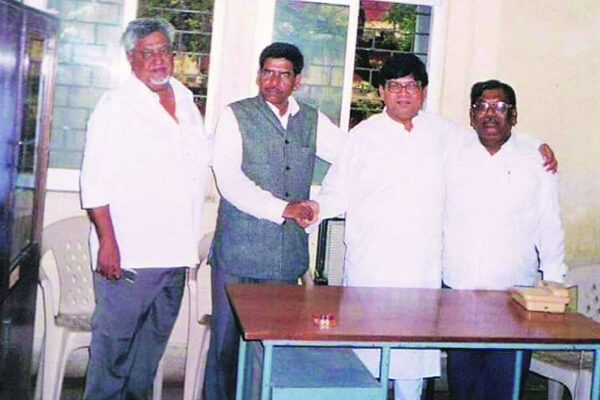
During this period, Mumbai was going through a transition in politics. Shiv Sena, with its ambiguous agenda of Marathi Manus became active. Clashes between Shiv Sena and Dalit Panthers were not so uncommon in this period. The dynastic rule of Congress party witnessed popularity as well as unexpected decline during the same decade. All these events culminated in fostering one element among Dalits and the other oppressed castes: their anger against their exploitation in the social, and political domain of Indian life.
In such a situation, the demand for a national hero became not only a necessity but it had grown into a promising commodity in the cultural domain as well.
The Angry Young Man phenomena, manufactured by Bollywood — making Amitabh Bachchan an ‘Industrial Hero’ as M Madhava Prasad called it — made this commodity available for the nation but only at the cost of erasing the history behind the anger. One that was against the caste-system.
Bollywood mobilised the anger of the masses and gave them an Angry Young Man, who manifested their anger on-screen while fighting against enemies: state and feudalism but never against caste. On-screen, this Angry Young Man possessed the anger of Dalit-Bahujan masses but was playing the role of savarna characters, seldom being an identity-less proletariat. Zanjeer (1973), Deewar (1974), and Sholay (1975) are crucial in popularising Amitabh Bachchan’s Angry Young Man.
***
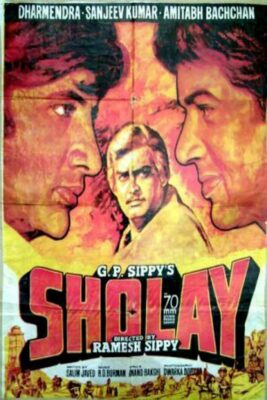
81KOa6ucxoL._SL1500_
My father often says that he watched Sholay in the theaters of Nagpur, three back-to-back shows in a day, innumerable times in 1975. My grandmother says that my father stopped going to school when he was in the 8th standard, as his obsession to watch these angry-young-man movies grew. He had seen all of Bachchan’s movies in this period, lingering around theaters in Nagpur, as if trying to find some solace from a life full of struggle; looking for answers in a reel world. As soon as he stopped school, he had to work for a large family of nine people, though his passion for movies remained unabated.
Bollywood’s biggest victims became the proletariat class among Dalits who were engaged in labour, and could not afford the company of books.
***
Dalits Panthers had come into existence in 1972 in Mumbai. Within a year, they attracted the attention of the society as well as the media, both Marathi and English. Their inspiration was The Black Panther Party founded in the USA. Dalit Panthers got on the nerves of everyone: savarna writers, politicians, and society. Skirmishes between them and Shiv Sena became regular in Mumbai. Later, these real developments formed the background for reel depiction of stories. Dalit/Ambedkarite/Buddhist population, and some other castes too in a minuscule number, were influenced by the literary imagination of Dalit Panthers. But there were some like my father, very much under the influence of Bollywood.
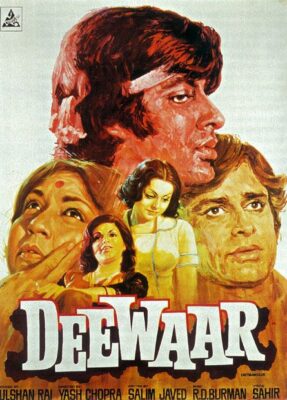
29e4e77b5ad2000224c0156a181e9f3b
In 1973, a year after Dalit Panthers had been formed, Prakash Mehra’s Zanjeer released. It was the first movie that made Amitabh a hero, an angry young man, in the nation’s imagination. Amitabh played the role of police inspector Vijay Khanna, Khatri by caste. He portrayed the character of an honest police officer, a state representative sympathetic to the stories of Dalit-Bahujans. Next year in 1974, Yash Chopra’s Deewar released. In this, Amitabh played the role of a coolie (Vijay Verma) at a dockyard who rose to prominence as a criminal gangster known for his ethical/moral way of functioning. It was an epic drama, with many subtexts.
Notably, during this time, the Dalit-Buddhist community had secured government jobs and achieved a bit of economic prosperity, and became a class unto itself. However, only a few among the Dalit community resembled Ravi (inspector and state representative). The majority of them still resembled Vijay (a victim of the past). Vijay’s anger, thus, is very much anger borrowed from Dalits.
The third movie in this sequence was Sholay (1975), the biggest blockbuster; the movie is a part of the memory of generations and resides in their mind as a symbol of a particular political time. In this movie, Amitabh played Jai (an identity-less petty criminal with some morality), alongside Veeru (played by Dharmendra). For Thakur’s revenge (also the representative of state, law and feudal order in the movie) played by Sanjeev Kumar, Jai had to die. In all these three films, the state remains alive.
The impact of these three movies was so colossal and irreversible that “the Amitabh Bachchan phenomenon can be said to represent the arrival of populism on the national arena,” as M Madhava Prasad wrote in his book Ideology of the Hindi Film.
***
Interrogating this curious phenomenon of Amitabh’s Savarna characters becoming angry young men on screen, Kuffir Nalgundwar in his article at Roundtable India throws a very pertinent question our way: “So what was the savarna angry young man angry about, anyway? There wasn’t much to complain about in the 70s, from his perspective. There weren’t any broad, significant challenges to brahminical hegemony, in the economic or social spheres. Savarna hold on the polity allowed no major intrusions, Mandal wasn’t even constituted until the late seventies, and nobody even looked back at its report until the late 80s”.
The effects of these Bollywood visuals were so irrevocable that its viewers/consumers, people like my father, remained under its influence for decades; from this their idea of the world had taken another turn in which they possessed anger but had forgotten the means by which this anger could liberate them.
The Dalit Panthers, however, the real angry men, guided people to pursue liberation in real life and their work was shaped by the acknowledgment of the roots of oppression: the caste system. Their anger was present in their work. As was their social history. Unlike Bollywood.
Yogesh Maitreya (wanjariyogesh85@gmail.com) is a poet and translator. He is a PhD scholar at the Tata Institute of Social Sciences, Mumbai, studying the history of Ambedkari Shahiri in Maharashtra. He is also a founder of Panther’s Paw Publication
Women Victims Bear The Brunt Of ‘MeToo’ In Kannada Film Industry
It took more than 80 women to speak up to finally send Hollywood producer and serial sexual predator Harvey Weinstein to prison. However, in India, male celebrities, accused of or outed as sexual predators are back to work, in full glory, while the women who’ve spoken up have had defamation cases filed against them, lost work and have also been slut-shamed.
The scene is worse in the Kannada film industry where firstly, women find it very hard to speak up and even when they do so, it’s their career and reputation that is affected and not that of the men accused. Actress Sruthi Hariharan, who alleged that actor Arjun Sarja had misbehaved with her on the sets of Vismaya, had to face trauma when she was slut-shamed and trolled for speaking about the incident.
That’s not all, she also has a defamation suit filed against her by the actor. “During the rehearsal, we delivered our lines and Mr Arjun hugs me. With no forewarning or permission, he runs his hands intimately up and down my back… During the course of production, every smutty innuendo he made, created an unpalatable work environment for me. His salacious invitations to meet him after work appalled me,” she’d said.
Sangeetha Bhat who kickstarted the #Metoo movement in Sandalwood spoke about her ordeal in the industry and narrated several instances of sexual harassment and decided to take a break from work owing to the trauma she faced. Director Ere Gowda too was accused of sexual harassment by a woman who chose to remain anonymous. Musician Raghu Dixit was named in #Metoo. After his name was revealed, Dixit went on to apologise but also sought to muddle the conversation by saying he was going through a ‘bad marriage’ and that he’d ‘misread the situation’. He is creating music for hit films, performing at gigs and even posted an update on Instagram about how he nearly lost his life when he was named, garnering sympathy. What’s alarming is members of the media continue to give publicity to predators despite everything they are privy to.
Also Read: Utsav Chakravarthy’s letter to Silverscreen.in
Actor Chetan, who is the Founder and Secretary of the FIRE (Film Industry for Rights and Equality) committee, which aims to tackle sexual harassment of women in the Kannada film industry, however, believes that it’s false to think that the #Metoo movement has not gained as much traction in the Kannada Film Industry (KFI) as compared to other industries. “Several women– both prominent and not– from all departments have taken stances against sexual harassment in their own capacities. KFI is also the first industry where members who believe in gender equality stood together on the same platform with legal basis to challenge sexual harassment and ‘casting couch’ via FIRE. This has resulted in considerable awareness among predatory men in our industry that such immoral, illegal actions will not be tolerated any longer, and this is surely a strong victory.”
Also Read: #MeToo Accused Make Comeback
In a world where women have to face the wrath of colleagues and society, for speaking up, Rapper Aditya Parashar, who’s worked on seven movies so far in Kannada, says, “The sexual predators who were called out have now gotten back to leading normal lives like before and the people/fans who supported them before still do so. A lot of support within the industry is not shown directly to the victims owing to the ‘career risk’ involved in it, making it more difficult for the victims to open up. It’s really a sad state of affairs. Men have not been held accountable for their actions.”
Chetan adds, “Many women are hesitant to come forward because they know that women who do will be immediately blamed and castigated by insensitive, questionable members of the film industry. That’s why FIRE, without taking sides, believes in objective investigations and legal advocacy for those who believe they have been sexually harassed. We must work to sensitise those in our industry who are in positions of power especially those who are involved in deciding who is taken for roles and/or jobs. Secondly, we must challenge patriarchy from an intersectional way outside of the industry whether that be caste or class patriarchy.”
Almost every actress who’s spoken up in Sandalwood has been shut down, ostracised or forced to apologise. Actress Sanjana Galrani accused producer Ravi Srivastava of forcing her to do intimate scenes in her very first film. Weeks later, she was made to apologise for making that allegation. Actress Avantika Shetty of Rangi Taranga fame had alleged that she was objectified by producer KA Suresh who accused her of not being disciplined.
Also Read: Ravi Srivastava Dismisses Allegations
The actress was asked to leave the film and she spoke up about it on Twitter. Post that, Avantika has hardly been seen in the industry. When Sruthi Hariharan spoke up about the harassment she faced, even the actresses who supported her were trolled. Actress Neethu Shetty, who was among them, says, “It took so many women to get Weinstein behind bars, but similar things have not happened here. However, I can sense that men are thinking twice about misbehaving. #Metoo movement has brought in apprehension about predatory moves, although it’s not something to appreciate as this is how it should’ve been from the beginning. Of course, a lot of men are not doing it not because it’s morally wrong, but because they’re scared of #Metoo.”
It’s not just men who support predatory behavior and misogyny, however. Actress Harshika Poonacha penned an open post when Sruthi’s case came to the limelight, where she slammed women who spoke up as those seeking publicity. “I would genuinely ask women to break their old patterns of thinking. It’s not about survival anymore, it’s time to live. We have to be more courageous,” Neethu, who says she calls out sexism among her own friends as well. “We have to start from the core, from our social circle. As for work, if someone is a proven #Metoo accused, I’m not going to work with that person, though it’s hard to know who is and isn’t these days,” she adds.
Anybody who speaks up in favour of a woman in the Kannada film industry is attacked too. Actors Prakash Raj and Chetan received flak for supporting Sruthi Hariharan. In a patriarchal industry that survives on hero worship, it’s going to take much longer for people to start believing women, What the women who have faced assault and abuse need is a safe platform to voice their stories and experiences, without being judged or traumatised further. Holding celebrity abusers accountable seems a long shot, for now.
Tamil Film ‘Mafia’ Under Fire For Portraying Victims Of Canadian Serial Murders As Criminals
Karthick Naren’s Mafia, about a narcotics cop on the trail of a mafia kingpin, starring Arun Vijay and Prasanna has been the source of heartbreak for some Canadian families, including Tamils in Canada. A board that is shown in the film, carrying images of suspects, uses the photographs of the victims of a serial murderer, Bruce McArthur, according to this report in CBC. The art director of Mafia is Siva Shankar.
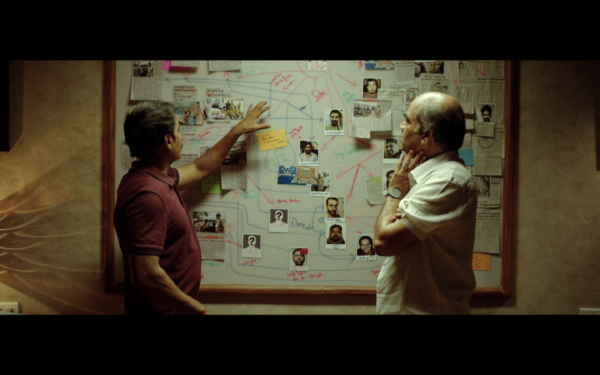
The report says that the photos of the murderer’s victims, Skandaraj Navaratnam, Selim Esen, Abdulbasir Faizi, Kirushna Kanagaratnam and Soroush Mahmudi, who were Sri Lankan Tamils in Canada and people of Middle Eastern origin, were used in the frame.
The piece highlights how the families of those murdered, living in Canada and Sri Lanka are very upset.
That this is a Tamil movie, produced by Lyca, whose promoter Subaksaran is a British Tamil entrepreneur with Sri Lankan origins is noteworthy.
The report in CBC by Angelina King also says that Mafia has been pulled out of Amazon Prime Canada, though the film is still streaming in Indian Prime.
Lyca, in a written statement to CBC has apologised and said that they will blur the photos out once they resume work after the COVID lockdown in India.
Bruce McArthur pleaded guilty to the murder of eight men between 2010 and 2017, in 2019 January.
Bindu Madhavi At The Launch Of A Bridal Wear Collection In Chennai
Pikchar With Rita: ‘Jugnu’, ‘Mahal’, And Karachi Of 1948
Pikchar With Rita is a fortnightly column on cinema by Rita Kothari. She’s a Professor of English at Ashoka University. She does not “do” film studies.
I wonder if you would go away thinking this is a film history column if I begin with a 1947 film Jugnu. Well, let me tell you that’s not the intention. I am merely trying to remember a detail that would tell me whether, during partition when Sindhis began to leave what became Pakistan, the film Mahal was playing or not in Karachi. I suspect that that day when Vinod-ja-dada (as in my father’s elder brother), whom we called “Vinod’s father” told me about the film Mahal, he may have meant Jugnu.
I was asking Dada of the days he left Sindh. He mentioned that he left Karachi in early January and took a ship to Bombay. What was that day like, I asked. He mentioned that it was a frightening day, with nobody daring to go out on the streets. ‘I had bought a ticket to come to Bombay, but what was to be done in the time before that. The conditions were not good, and what was the safest place to go to? I went into the cinema hall and watched a film.’ He went on to describe what a good pair Ashok Kumar and Madhubala made. His wife, my aunt, whom I called “Bhen” (as in sister) because she was my mother’s sister-like cousin, reminded him that Ashok Kumar was better with Devika Rani. They argued over these details.
In my head, I tried to match the date of his leaving with the riots of early January in 1948. If that was indeed the case, Dada could not have watched Mahal. It was released in 1949. He must have watched another famous film in 1947 – Jugnu and was playing in Karachi for a long time. Dada was either mistaken about the film or the historical date. But he even hummed the song, “Aayega aayega…” from the film. He couldn’t be making that up. The date was less important than the song, and this is all I am trying to figure out.
The memory of films we have watched, songs we have heard and hummed and recalled carve a history, and believe me, this is the only history lesson I learnt from home. This was also the culture-vulture lesson I learnt from home. If Dada escaped to a cinema hall, my entire community made a similar escape after a hard day’s work as shopkeepers, vendors, hawkers…
Films and television serials formed, for us, the reference points to match ourselves against. Dada wore white pants only. He said he was influenced by Jitendra. He and Bhen produced eleven children. Each of them looked like a film star. In a family with limited means, each saved money to have clothes or hairstyles that helped them emulate the stars they had adopted. I heard Dada tell me the film story when I wanted to interview him about Partition. He mentioned going to the RSS shakha every morning and building his body, but his interest clearly lay in other memories. So you see, this is the point: this column is not about history, its other memories of watching and remembering pikchar as we go through lives, riots, lockdowns.
Prithviraj And The Team Of ‘Aadujeevitham’ Stuck In Wadi Rum
On Wednesday afternoon, actor-producer Prithviraj Sukumaran posted a tweet stating that he along with the crew of his next film Aadujeevitham are stuck at the Wadi Rum desert in Jordan owing to the Coronavirus pandemic that has left the world devastated. The crew was reportedly shooting for the film till March 27 after acquiring proper permission from the authorities.
#Aadujeevitham pic.twitter.com/hwX4MFmQwJ
— Prithviraj Sukumaran (@PrithviOfficial) April 1, 2020
In the wake of the Coronavirus pandemic, all release, production and post-production activities of the various film industries worldwide have come to a standstill since mid-March. But the team of Prithviraj starrer Aadujeevitham was found engaged in the filming process till March 27. They were initially stopped on March 24, much like other film crews, but received approval from the government of Jordan as they were reportedly following all rules and were in proper isolation in the Wadi Rum desert.
As the situation worsened, their permission to shoot was revoked and the team was asked to return to India at the earliest. But owing to the lockdown imposed in India, there was no possibility for the crew to return. Though the crew has everything, including food and accommodation, sorted till the second week of April, they aren’t reportedly prepared for the weeks beyond.

aadujeevitham-prithviraj-amala-paul
“We completely understand that given the circumstances around the world, our team of 58 might not be the biggest concern of authorities back home now, and rightfully so. But we also felt that it was our duty to let all concerned know about the situation and keep them updated. There are thousands of Indians around the world waiting to get back home and we hope when the appropriate time and opportunity arrives, we are also able to come back to India. Till then, I hope all of you stay safe and let’s collectively hope and pray that life gets back to normal soon. Cheers,” said the actor in his tweet.
The 58-member team also comprises a doctor who has been conducting checkups for the crew every 72 hours along with a government-appointed Jordanian doctor.

aadujeevitham-prithviraj-amala-paul-1
The director of the film, Blessy, has also sought help from the Kerala Film Chamber of Commerce to bring the crew back to Kerala through email. He has requested them to enable the crew to be able to get back to India before the visas of the members expire.
On receiving the email from the chamber, the Cultural Minister of Kerala, A K Balan, has reportedly spoken to Chief Minister Pinarayi Vijayan and the Union Minister of State for External Affairs, V Muraleedharan, about the issue.
“The Union minister has promised to take necessary measures to extend their visas as it is not possible to bring them back home at the moment,” said Balan in a statement.
According to a report on Onmanorama, when the outbreak happened in mid-March, Chief Minister Pinarayi Vijayanand had directed the NORKA Principal Secretary to notify the Indian embassy at Jordan about the crew. When the embassy contacted the crew, they found that the team was keen on continuing the shoot given the fact that they had undertaken all safety measures.

aadujeevitham-prithviraj-amala-paul-poster
Aadujeevitham is helmed by Blessy, a former associate of director Lohithadas. Bankrolled by K.G. Abraham, the film will release in 3D this year. The film is based on Benyamin’s best-selling book of the same name that talks about the plight of a Malayali who goes in search of a job to the Gulf.
Prithviraj is believed to be sporting two looks for the movie. While one look demands a fairly built physique, the other requires him to shed weight. This is the reason the movie’s shoot, which began in March 2018, is spread across a span of two years.
While Amala Paul plays the female lead, marking the first association of the actor with Prithviraj, actors Vineeth Srinivasan and Aparna Balamurali have landed significant roles in the film.
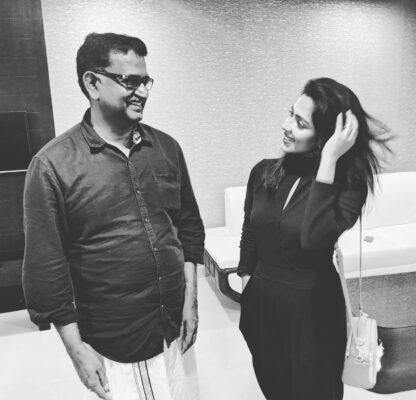
aadujeevitham-prithviraj-amala-paul-3
AR Rahman is composing for the film, marking the maestro’s comeback to Malayalam after a gap of 28 years. He last composed in Malayalam for the Mohanlal starrer Yodha in 1992. K.U.Mohanan is handling cinematography, Sreekar Prasad is editing and Resul Pookutty is designing sound.
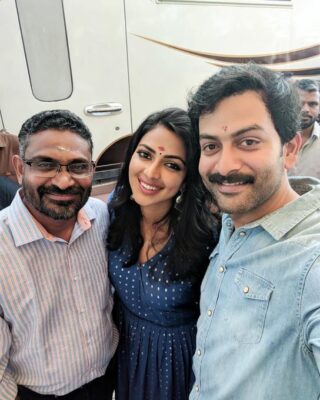
aadujeevitham-prithviraj-amala-paul-2
Hansika Motwani At A Product Launch
Bergman’s ‘Persona’ As A Metaphor For The Lockdown; Revisiting Five Iconic Frames
There’s news, of a virus, of wet markets where animals are slaughtered, of death. You’re at home, all day. Locked up. Locked down. Your life is unknotted from the real world, but you watch through looking glasses. Phone. Laptop. TV. Window. Curtain. Windscreen. Helmet. They’re apertures and filters; a flood of images vying for your ever-diminishing attention. The outdoors is empty. Still. Cold. De-peopled. Entertainment, religion, porn, music – they help you escape. But they offer no answers, no fix-its. Sleep, wakefulness, dreams, reality melt into a stream of semi-consciousness in your protoplasmic existence. You have to wait. You have to watch.
Waiting, watching, watching, waiting, all you want to do sometimes is reach for the screen. Touch it. Feel it. Hold it. In an attempt to understand which side of your screen is real. Like the boy in that iconic opening montage of Ingmar Bergman’s Persona.

In Persona, an actress, Elisabet, just stops talking suddenly during rehearsal, and she never talks after that. Her doctor sends her away to a seaside cottage, to live with a nurse, Alma, in, well, self-isolation.
Screenshot 2020-03-31 at 6.42.30 PMIn Bergman’s 1966 classic, Persona, an actress, Elisabet, just stops talking suddenly during rehearsal, and she never talks after that. Her doctor sends her away to a seaside cottage, to live with a nurse, Alma, in, well, self-isolation.
Alma can’t stop talking, tells Elisabet every little thing about her life.
The women start becoming one, with each taking on the personality of the other.

What happens to people living in close company for days on end…
Screenshot 2020-03-30 at 8.28.01 PMWhat happens to people living in close company for days on end…
…and who’s watching us from the other side of that screen?
What will happen with a billion of us social distancing? Persona has no easy answers, but points us towards the right questions. Watch it here.
‘Four More Shots Please!’ Is Back With A Second Season On Amazon Prime
Amazon Prime Video today unveiled the trailer for the second season of the Amazon Original Series Four More Shots Please! The series that premiered on Amazon Prime Video in early 2109, follows four women and their journey through friendship and tequila in Mumbai.
Four More Shots Please! stars Sayani Gupta, Kirti Kulhari, Bani J and Maanvi Gagroo along with an ensemble cast including Prateik Babbar, Lisa Ray, Milind Soman, Neil Bhoopalam, Simone Singh and Amrita Puri. Season Two will see some fresh additions to this star cast and will answer some of the questions left from the previous season.
The second season of the show begins in Istanbul where, after a gap away from each other, they find themselves back together to find one of the foursome who has seemingly vanished! Created by Rangita Pritish Nandy Four More Shots Please! is produced by Pritish Nandy Communications Ltd, and directed by Nupur Asthana.
The second season will also focus on the choices these four young women make as they continue to navigate life, their friendship, love, ambitions, and evolving freedoms in Mumbai where their lives and the city itself is also evolving. The second season of the show premieres on Prime Video on 17 April in multiple languages including Hindi, Tamil and Telugu.
Watch the trailer here:
Happy Birthday: Janani
Jitendra Kumar, Neena Gupta Star In Eight-Part Dramedy, Amazon Prime’s ‘Panchayat’
Amazon Prime Video has just released the trailer and poster for its upcoming series, Panchayat. The series marks the second collaboration between Prime Video and The Viral Fever (TVF) after Hostel Daze and Kota Factory. The series will stream globally from 3 April.
The series stars Jitendra Kumar (Shubh Mangal Zyaada Savdhan) as the protagonist and Neena Gupta, Raghubir Yadav, and Biswapati Sarkar as the employees of a local panchayat office. The show captures the journey of an urban protagonist Abhishek Tripathi, who for lack of a better job option, joins as the secretary of a panchayat office in a remote village in Uttar Pradesh.
Stuck between ‘crazy’ characters, Abhishek, like a fish out of water, unwillingly starts his job but with the sole motivation of getting out of there as soon as possible. He even prepares for CAT.
“Panchayat is the unique and charming story of a young man struggling to adjust to his new life in a remote village,” actor Jitendra Kumar, who plays the lead, said. “I am so thrilled that I get to work with Neena Gupta once again!”
On her role, Neena Gupta said, “Playing the role of Manju Devi, a quirky matriarchal homemaker and official village Pradhan, was a huge amount of fun, especially alongside such a talented cast and crew. This is a series with plenty of heart. I know people are going to fall in love with the unique characters and authentic rural flavour.”
Watch the trailer here:
Nithiin And Keerthy Suresh Star In ‘Rang De’, Venkat Atluri’s Telugu Rom-Com; First Look Out Now
The motion poster and first look of Nithiin and Keerthy Suresh starrer Rang De is out now. The film directed by Venkat Atluri touted to be a romantic comedy, has music by Devi Sri Prasad and cinematography by PC Sreeram.
Youth Star @actor_nithiin requesting his fans not to celebrate his birthday which is tomorrow. Also his wedding on April 16th has been postponed due to #Lockdown.He is urging, Together we can fight against #Corona by staying safe at home. #StayAtHomeAndStaySafe pic.twitter.com/Tq9OBI2Fkm
— BARaju (@baraju_SuperHit) March 29, 2020
The actor who celebrates his birthday today had recently sent a message to his fans, asking them to maintain social distance and not celebrate his birthday. He’d also announced the postponement of his wedding, with fiance Shalini, that was to take place in April in Dubai.

EUWJHYaUUAARsYP
Written and Directed by Venky Atluri, the film will have editing by Navin Nooli, art by Avinash Kolla, and additional screenplay by Satish Chandra Pasam.
Here is the 1st look motion poster of RANG DE ❤️❤️ https://t.co/pAw1HZfIOl@pcsreeram @ThisIsDSP @dirvenky_atluri @KeerthyOfficial @vamsi84 @SitharaEnts @haarikahassine
— nithiin (@actor_nithiin) March 29, 2020
Nithiin plays Arjun and Keerthy, Anu, in Rang De according to the posters.
Chinese Film ‘So Long My Son’: A Gripping Drama On The Effects Of The Political On The Personal
“Germany is the first country that Hitler attacked”: Unknown
Chinese filmmaker Wang Xiaoshuai’s So Long My Son opens to a scene of heartbreak – a little boy has drowned in a reservoir. His parents and a few other people rush him to the hospital where he’s declared dead. On the sideline, a mother runs to her boy, the friend of the victim, perched on a rock overlooking the spot of the tragedy, trembling. At this point, life changes for all the characters.
So Long My Son is a critique of the Chinese government – especially the one-child policy it imposed on its citizens in 1979 to press on economic prosperity and rolled back in 2015 – masqueraded as a deeply affecting slow-moving saga of two families over a period of three decades.
The film, the winner of the Best Actor and Best Actress awards at the 2019 Berlin Film Festival, begins in the late 1970s in post-Cultural Revolution China, and ends in the present day when the country has transitioned to state capitalism.
The characters are constantly in motion and transformation. They go from cities to villages, from being friends to strangers; their reality continuously meddled with by the government.
From the opening scene, the film shifts to a different timeline and a town by the side of the sea where the parents of dead boy, Liyun (Yong Mei) and Yaojun (Wang Jingchun) are now living with a teenager whom they address as their son. The boy is even named Xingxing, after their late son.
The narrative structure doesn’t immediately provide the audience with an explanation to the rough relationship the couple share with him. Is he their second child, or a foster son? Xiaoshuai spills information in a painstakingly slow fashion, unfolding bit by bit the big picture of the emotional turmoil the characters suffer from.
The non-linear film, which might come across as ambiguous in the initial parts, is a brilliant counterpoint to the principles the Chinese government has forever been pressing on its people, to straighten human existence out into easily memorisable statistics and codes, and repress the country’s history.
The present, the film says, is deeply connected to the past. Life is barely easy for the characters as they are weighed down by unexpressed emotions and guilt. The essence of humanness, the ability to feel, is hard to be erased.
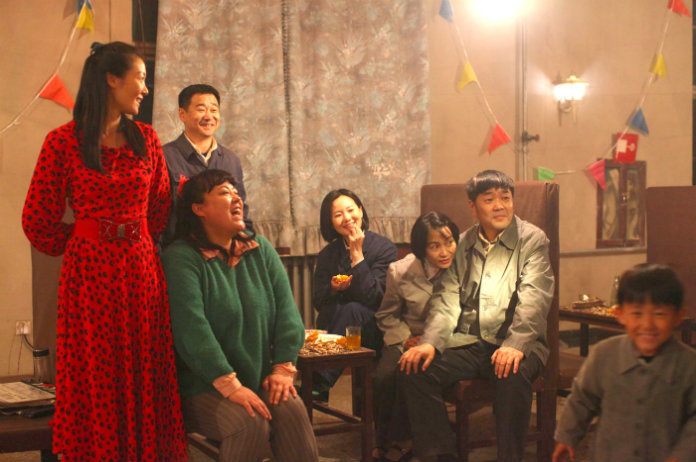
SoLongMySon_trigon-film
A flashback sequence shows that Liyun was forced by her best friend and colleague, a loyal member of the communist party, to undergo an abortion when she’s discovered to be pregnant with a second child. The surgery scars her permanently, first physically and later emotionally, after the death of little Xingxing, as she would no longer be able to bear a child and be a mother.
Wang Xiaoshuai is widely regarded as one of the prominent sixth generation Chinese filmmakers who weren’t directly affected by the Cultural Revolution. He lived most of his life in the city, in the time of economic progression. His films, like the works of filmmakers like Jia Zhangke, looks at the impact of the revolution in contemporary Chinese society. He uses the prism of intimate stories and family dramas. One of the primary themes he tries to explore in So Long My Son is the undue amount of sacrifices an individual is forced to make for nation-building.
After the forced abortion and sterilisation, Liyun and Yaojun are hailed as ‘heroes’ and are felicitated by the communist party. At the ceremony, they are coerced into smiling for photographers, although the camera, in tight shots, only reveals their pain. A few scenes later, the factory terminates their employment contract. The economic progress the protagonists sacrificed their unborn child and peace of mind for, doesn’t lift them up from their state of poverty. One of the sub-characters, a cheerful friend of the couple, is imprisoned by the state on the grounds of breaking rules – he played Boney M music at an underground house party. He returns as an emotionally disabled man, unable to express his anger or gloom.
Xiaoshuai focuses on depiction of melancholy through non-verbal scenes. The characters almost never reach a point of catharsis until the climactic moments. The film concludes in a picture-perfect image that shows the characters having moved on in their life, far enough to pardon the state of the damages it inflicted on them.
So Long My Son is one of the two major Chinese films on the One Child Policy, which made waves in the international film festival circuit in 2019. The other film, director Nanfu Wang’s documentary One Child Nation, closely examines a society overridden by propaganda that submitted itself to a social experiment of far-reaching impacts. Wang’s film is banned in China, which is unsurprising for such hard-hitting critiques of Chinese government are unlikely to pass through the the country’s strict censorship laws. But So Long My Son, interestingly, not only received the nod of the country’s propaganda department, but also bagged two important awards at China’s top film awards known as Golden Roosters last year.
Xiaoshuai’s narrative style has soft-edges that drives the viewers’ immediate attention to the emotional details. One of the prominent narrative devices he uses is a Scottish ballad about friendship, Auld Lang Syne, which is immensely popular in China cutting across its past and present generations. By focusing on the human elements – the suffering, the complex dynamics within relationships, and the little gestures – the filmmaker tells the audience that history, at the end of it all, is about people, and not about national policies.
SS Rajamouli’s ‘RRR’ And Movie Promos In The Time Of Lockdown
The buzz around SS Rajamouli’s first post-Baahubali film RRR has been huge. The film about Telugu revolutionaries, Ram Charan’s Alluri Seetharama Raju and Jr. NTR’s Komaram Bheem, also stars Alia Bhatt, Olivia Morris, and Ajay Devgn. Last week, in the midst of a nationwide lockdown, over Coronavirus, two promos around the film were launched.
First came the motion poster of RRR – Roudram Ranam Rudhiram in Telugu, Rise Roar Revolt in Hindi, Ratham Ranam Rowthiram in Tamil.
And then the other, the first look video of Ram Charan’s character.
Just ahead of these promos, both Chiranjeevi and Ram Charan joined Twitter. And a conversation, presumably part of the build to the launch of these teasers, ensued in the form of banter between Tarak, Ram Charan, Chiranjeevi, and Rajamouli.
Bro @AlwaysRamCharan, I wish I could’ve celebrated your birthday under better circumstances. But since we’re under a lockdown & because staying home is important,I’m giving you a digital surprise at 10am tomorrow. Trust me,this is a bang you won’t ever forget #BheemforRamaraju pic.twitter.com/Xq13wBBXOY
— Jr NTR (@tarak9999) March 26, 2020
Woahhh! I think I have joined twitter at the right time or else I would have missed your surprise bro..😉 Can’t wait for tomorrow… https://t.co/HITNGik1jm
— Ram Charan (@AlwaysRamCharan) March 26, 2020
Sorry brother @AlwaysRamCharan . I sent your gift to Jakkanna @ssrajamouli last night for his opinion. Being Rajamouli, you know how it goes. 🤦🏻♂️
Small delay..— Jr NTR (@tarak9999) March 27, 2020
What!!
You sent it to HIM!!??Will I get it today?? https://t.co/yQOQH7gUjV
— Ram Charan (@AlwaysRamCharan) March 27, 2020
I am Waiting… #BheemforRamaraju @tarak9999 @AlwaysRamCharan #HBDRamcharan pic.twitter.com/c8o9wbd2K4
— Chiranjeevi Konidela (@KChiruTweets) March 27, 2020
Saaaar…ante….adhi…konchem…. koncheme…..actualgaa……please… Sir… https://t.co/MgAmBQvbDz
— rajamouli ss (@ssrajamouli) March 27, 2020
After this ‘tease’, NTR launched the first look.
While several films have stalled work in the wake of the shutdown across the country, no other high budget, high profile project has released any big news or first look posters. PR has come to a standstill as far as projects are concerned. Perhaps for fear of being relegated to the sides, as much more pressing events are unfolding across the nation.
In an interview with Rajeev Masand, Rajamouli explained why he’d decided to go against the grain and release RRR promos now. “With so much going on, we really debated, really contemplated, whether to put this material out or not. Is this the right time to do it or not?” The crew finally decided that it wanted to release these now because if the message is to stay at home, this might incentivise people to do so by giving them entertainment. “We know that the traction we’ll get out of this is nothing compared to if we release this two-three months later. But we decided to do this now because it will be a happy distraction for people from so much stress,” the filmmaker said.
Watch the full interview here:
Veteran Folk Singer and Actress Paravai Muniyamma Passes Away At 83
Veteran folk singer and actress Paravai Muniyamma who shot to fame with the Vikram starrer Dhool in 2003 for her ‘Singam Pola Nadanthu Varaan…’ song, passed away in the wee hours of Sunday, 29 March, at the age of 83, in Madurai owing to kidney failure.
Hailing from a town called Paravai in Madurai, she has acted in more than 80 films and has contributed a lot to folk music.
In November, the actress was admitted to Velammal Hospital, Madurai owing to deterioration in her condition. Unfortunately, false news that the actress had passed away back then was widespread. The hospital management then sent out a press release stating that the actress is keeping well. The medical expenses were also being taken care of by the hospital management.
She was also hospitalised back in 2015 and received support from many actors including Dhanush, Sivakarthikeyan and the then Nadigar Sangam president R Sarathkumar who financed her treatment. Late Chief Minister J Jayalalithaa too had facilitated the opening of a fixed deposit account worth 6 lakhs in Muniyamma’s name.
The actor’s last rites will be performed on Sunday evening in Madurai with family and relatives in attendance.
The actress was last seen in director Jaison’s horror-drama Sathura Adi 3500 (2017).